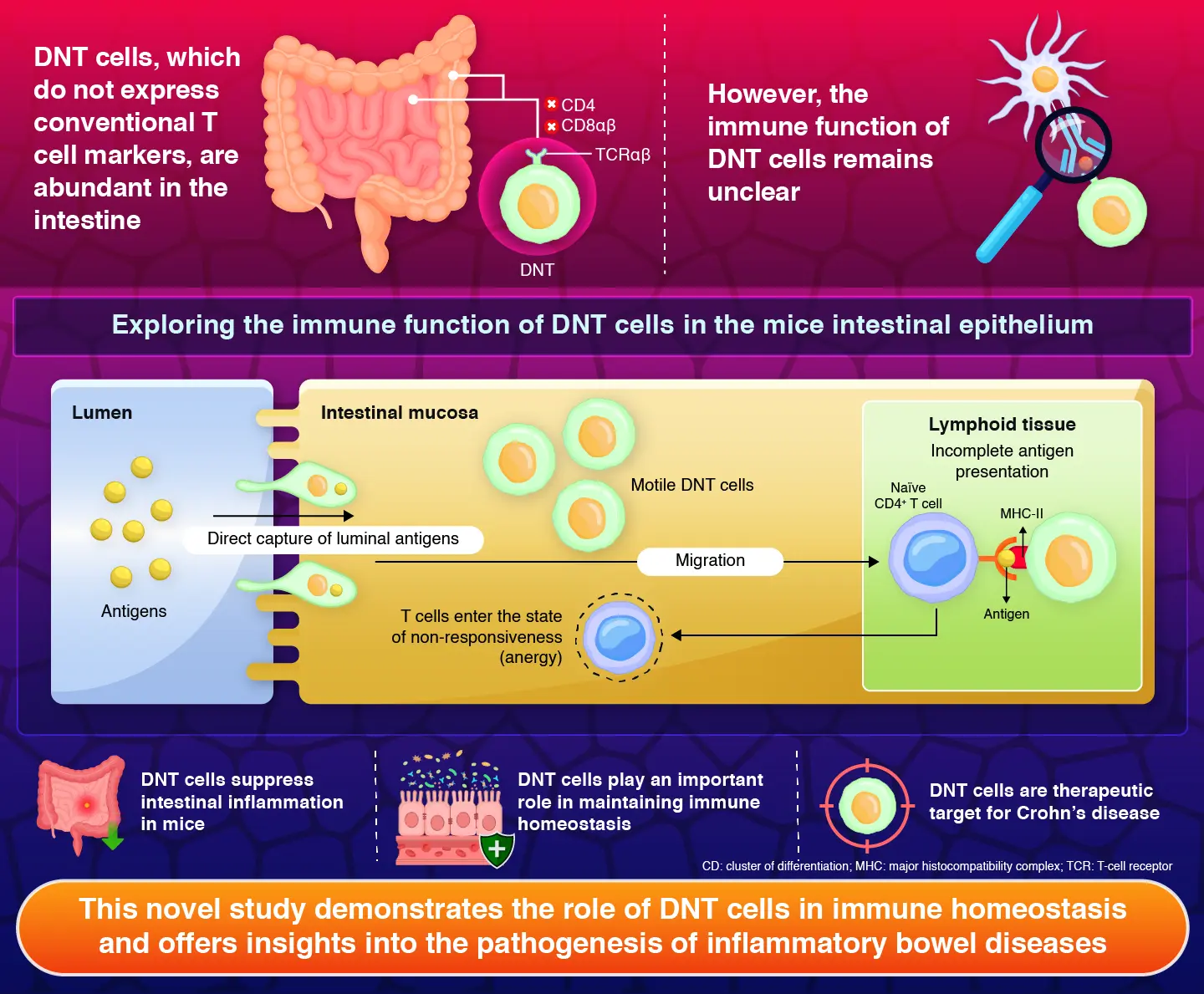Immune cells called double negative T cells are abundant in the intestine but have been poorly understood till date. In a recent study, researchers from Institute of Science Tokyo report that these cells actually have an indispensable role in suppressing intestinal inflammation. Through cutting-edge microscopy that allows live imaging, the movement and functioning of these cells were visualized for the first time, providing insights into conditions such as Crohn's disease.
Novel Immune Function of Intestinal Double Negative CD4-CD8αβ-TCRαβ+ T (DNT) Cells

Nemoto et al. (2025) | Nature Communications | 10.1038/s41467-025-62089-y
It may surprise you to learn that your gut is home to a large number of highly specialized immune cells; in fact, the mammalian gut is considered to be among the largest immune organs in the body! The gut is particularly rich in T cells—immune cells which can recognize different antigens, i.e., molecules that may trigger an immune response.
One such set of T cells are known as double negative T (DNT) cells—these are 'unconventional' cells that lack the usual markers (proteins found on the surface of a cell) that are present on the other 'conventional' T cells such as CD4+ T cells. DNT cells lack CD4 and CD8αβ markers but contain TCRαβ marker on their surface. DNT cells are also particularly abundant in the intestine as compared to other organs; however, their function has remained a mystery till date.
Against this backdrop, a research team led by Associate Professor Yasuhiro Nemoto and Professor Ryuichi Okamoto from the Department of Gastroenterology and Hepatology, Institute of Science Tokyo (Science Tokyo), Japan, has obtained startling new insights into the immune function of DNT cells in a collaborative study whose findings have been published in Volume 16 of the journal Nature Communications on August 01, 2025.
The team accomplished this using a cutting-edge microscopy technique known as intravital microscopy in order to observe DNT cells in the intestines of live mice. They succeeded in visualizing the independent movement or motility of these cells. Even more exciting was the unveiling of a previously unknown function of these cells—their role as 'antigen-presenting' cells in the intestine.
For context, T cells can only recognize and react to antigens when they are 'presented' to them on the surface of other cells, and this process is known as antigen presentation. Antigen presentation leads to the activation of previously inactivated 'naïve' T cells, which can then lead to an immune response.
Nemoto says, "This study is the first in the world to discover that DNT cells, which are abundant in the intestine, possess a novel immune function—DNT cells can act as antigen-presenting cells." In this case, it was observed that DNT cells took on the role of antigen-presenting cells; their motility meant that they were able to directly take up antigens in the intestine and subsequently migrate to lymphoid tissues in order to present these antigens to naïve CD4+ T cells. There is one last twist in this process; while DNT cells do present antigens to CD4+ T cells, they do not express the 'co-stimulatory' molecules that are necessary for actually activating the T cells.
Nemoto explains about the relevancy, "Because of the lack of co-stimulatory molecules, when DNT cells present antigens, CD4+ T cells are not activated but instead enter a state of non-responsiveness or anergy." The implications of these findings are enormous: through their role in antigen presentation, DNT cells actually play a key role in suppressing inflammation.
This was confirmed through studies in mice with intestinal inflammation, more importantly, however; it was also found that DNT cells from patients with Crohn's disease (an inflammatory bowel condition) also showed impaired antigen uptake and presentation. Nemoto explains, "These findings suggest that dysfunction of DNT cells may contribute to the pathogenesis of Crohn's disease."
This novel study presents new insights into the mechanisms underlying intestinal inflammation and Crohn's disease, suggesting that DNT cells may be a potential therapeutic target for treating this chronic condition in the future!
Reference
- Authors:
- Yasuhiro Nemoto1,2*, Ryo Morikawa1, Yuki Yonemoto1, Shohei Tanaka1, Yuria Takei1, Shigeru Oshima1, Takashi Nagaishi1,3, Kiichiro Tsuchiya1,4, Tetsuya Nakamura1,5, Kento Takenaka1, Kazuo Ohtsuka1, Xigui Chen6, Hitoshi Okazawa6, Ryuichi Okamoto1, Mamoru Watanabe1,7, and Ulrich H. von Andrian2,8*
- Title:
- Intestinal CD4−CD8αβ−TCRαβ+ T cells function as tolerogenic antigen presenting cells in mice
- Journal:
- Nature Communications
- Affiliations:
- 1Department of Gastroenterology and Hepatology, Institute of Science Tokyo, Japan
2Department of Immunology, Harvard Medical School, USA
3Department of Advanced Therapeutics for GI Diseases, Institute of Science Tokyo, Japan
4Department of Gastroenterology, University of Tsukuba, Japan
5Advanced Research Institute for Health Science, Juntendo University School of Medicine, Japan
6Department of Neuropathology, Institute of Science Tokyo, Japan
7Graduate School of Medicine, Juntendo University, Japan
8Ragon Institute of MGH, MIT and Harvard, Cambridge, USA






